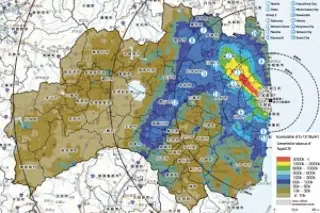Fukushima prefecture: ground zero. World Health Organization Today marks the second anniversary of the tsunami that wiped out a nuclear plant on the coast of Japan and lead to a triple meltdown. The emotional fallout from the disaster has been an enormous setback for the promoters of fission-generated power. But of the four fundamental forces of nature, it is gravity, not nuclear, that has caused the most casualties at Fukushima. The death toll from the crashing waves killed some 20,000 people. But no one, including emergency workers at the plant, has died from the radiation, and no one has yet been diagnosed with a radiation-induced cancer. It is still very early. Ionizing rays -- the kind powerful enough to break molecular bonds -- can mutate genes, and the effects may not be apparent for decades. All we can do is predict. A report released late last month by the United ...
The Cancer from Fukushima (and Hiroshima)
Discover the long-term effects of radiation on Fukushima prefecture residents and the surprisingly low cancer risks post-disaster.
More on Discover
Stay Curious
SubscribeTo The Magazine
Save up to 40% off the cover price when you subscribe to Discover magazine.
Subscribe













